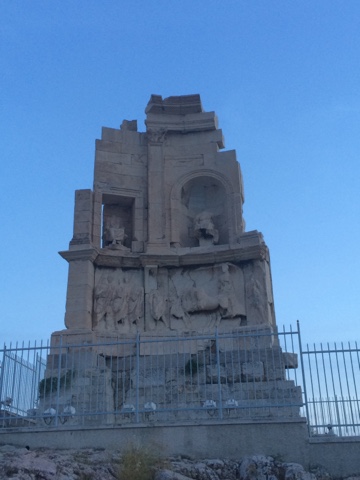6/4/15
Epidarus- Temple of Asklepios, younger god, half human, often has a dog in his iconography for its saliva that is good for wounds, stick for traveling with snake wrapped around it is a symbol for life and venom can be used for medicine, mankind has been searching for answers and with accumulated knowledge of anatomy and medicine- human interference could play a role, like Asklepios, in the middle, used similar tools that surgeons use today, Theatre, 4th c bc, 14k people, not a big city so it was a gathering place, festivals of asklepieia, thymele building with mix of Doric and Corinthian columns, labyrinth construction in basement with snakes, not a normal temple building,
Mycenae- tomb of Agamemnons father, 13th c bc, beehive, disappears into landscape, covered by earth, relief triangle, they made a deity of Agamemnon with a temple, watch men's tower with fire posts on all the mountains,
Augustine reaches the conclusion of the part of City of God where his main goal is to refute the prosperity associated with pagan gods. By showing that the Roman Empire has not been expanded because of those gods, he explains that it is actually because of the one true God. He rejects fate by instead looking to divine providence in accordance to free will. Augustine looks to God's plan for the Roman Empire's future. Cicero claims that no one, not even God, can predict the future. However, Augustine disagrees and sees that we must surrender some of our pride and admit that God foreknew our voluntary thoughts to actually be involuntary since He is all-knowing. If we are to take Cicero's perspective, if fate prevails, it is the ultimate ruler, and our laws, rewards, and punishments become an empty form of justice. Whereas everything happens through God, nothing happens by Fate. However, evil wills are not created by God because they are not in His nature, but those wills have no power unless he has given it to them. Therefore, God would not want nations such as the Roman Empire to think they were exempt from his providence. To compare the rewards of the Roman heroes to the saints, we see where worldly honor that has been given to them from human beings is incomparable to the endurance of the sainthood in the City of God. Taking a step back to look at the brevity of this life on earth, Augustine questions the role of a government of a man about to die. If the ultimate goal is true piety, necessary for true virtue, then the role of the earthly city is to not get in the way of that. While Rome has been rewarded because of their relatively honorable empire of the earth, those with true virtue cannot serve human glory; therefore, those a part of the eternal city are not truly a part of the earthly city. Emperors should follow this model of eternal citizenry to be truly happy by acting accordingly: fear and love and worship God, share their kingdoms power with His, be merciful, punish justly, modest in material things, and "if they do all these things from love of eternal happiness than ardor for empty glory." While Augustine directs this to the rulers specifically, I think it is a fairly good list to extend to all citizens of God that are temporarily visitors of this world.
Biblical Heritage (2 Corinthians, Week in Corinth 6-10)
In A Week in the Life of Corinth, Paul is summoned to the Roman courts by a Jewish priest. He takes his trial-by-judge very nonchalantly as he feels secure when he has his wealthy friends to back him up. However, none of them are there because Erastos is still recovering from what seems like a coma, as he has been passed out for many days, as a result of being beaten up by some of Aumelion's hooligans in his way to fix his aqueduct. But since Paul is caught in a dispute with a Jew, the Judge Gallio shows little interest in Jewish law and states his job is only to cover Roman jurisdiction. So until they find that Paul has broken Roman law, they have no case. At work in this trial, the reader can see have the lack of consideration for the Jewish faith's legitimacy in the sight of the Roman government as well as the conflict caused by the strain of the Christian grounding in the Jewish synagogues and law.
Next, they begin discussing whether or not you can eat sacrificial meat, a point of contention between Gentiles and Jews that convert to Christianity. Does it make you a bad Christian for eating the meat meant for pagan gods? Christian aristocrats are often a part of the political dinners that use this meat. Christians in the lower class are in no position to turn down food in whatever form it comes. Therefore, Paul advises that you can eat it because everythingh is the Lord's. He becomes unclear though as he states next that, unless you feel guilty or worried to offend, for the sake of conscience do not eat sacrificial meat. There must be a deeper principle to help believers find an answer because the Bible is quite ambiguous.



































